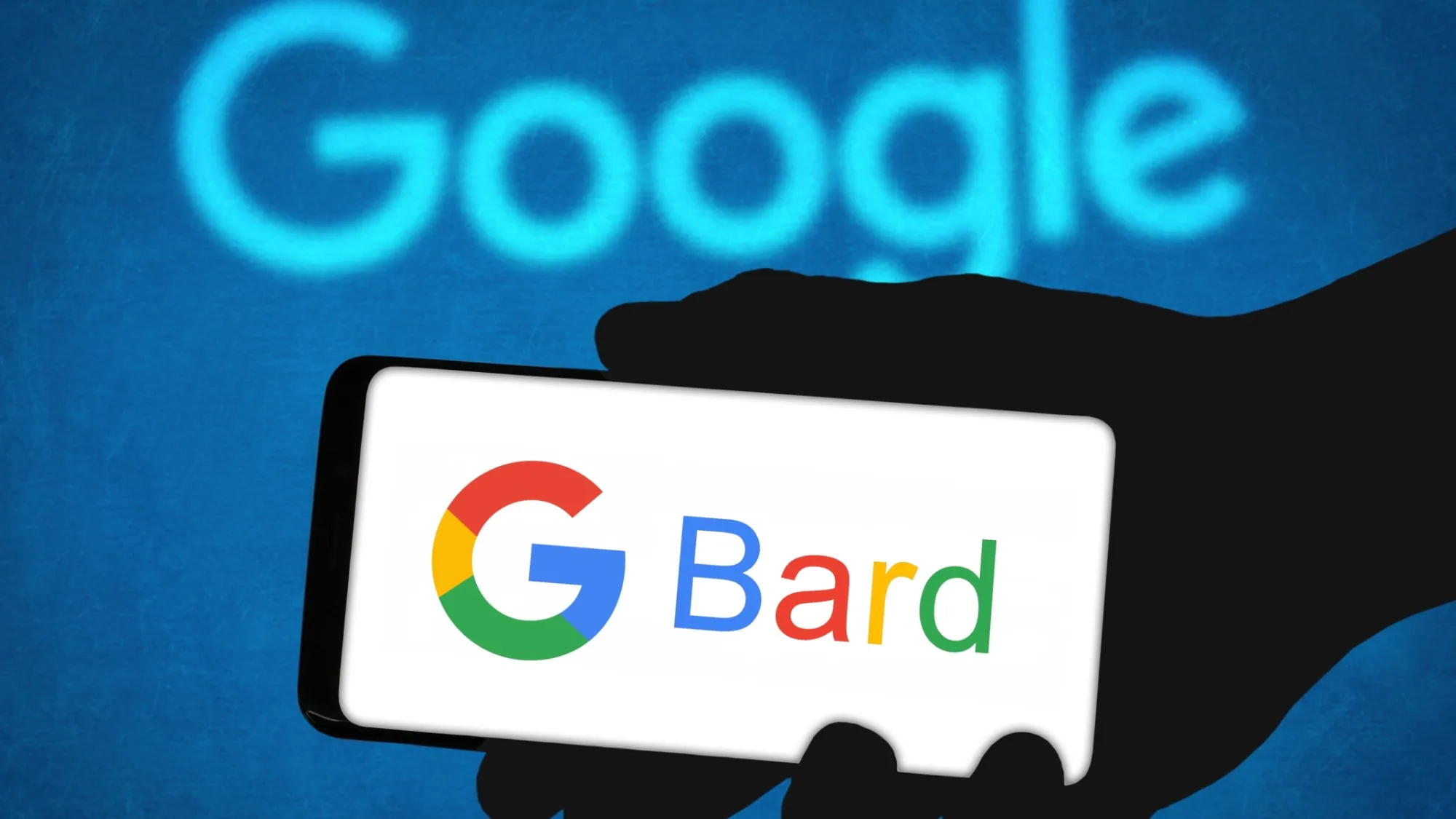“Plagiarism is one of the great academic sins”. It is a serious offense that is bound to have professional and academic consequences. This raises the question of can Google Bard be detected as plagiarism. With the advent of AI technology in Natural Language Processing chatbots, it has recently become extremely complicated to detect plagiarized content. Most AI enthusiasts are curious to know Google Bard’s competence while content generation.
Google has officially joined the race for AI technologies with the launch of Google Bard, on 21 March 2023. It is a conversational AI chatbot, that is currently in the beta testing phase. Google Bard has been developed based on Google’s LaMDA, which is a Transformer-based model. Google Bard has now been launched as a separate webpage and can also be added as a Google extension.
Google Bard can be detected as plagiarism. It collects information from infiniset data, to generate responses to the user’s queries. This might result in Google Bard generating plagiarized content that could be detected with advanced AI plagiarism detection tools.
AI Plagiarism detection tools make use of a number of methods to identify copied content. But can Google Bard be detected as plagiarism by them? Read on to learn the advanced plagiarism detection technique that detects Google Bard plagiarism and ways in which you can avoid plagiarism while using Google Bard.
What Is Google Bard Plagiarism Detection Mechanisms?
Literary works, academic research, journal articles, etc., are easily accessible all through the World Wide Web. Students, research scholars, and content writers can access any information that they are looking for at the click of a button. Now, with the advent of the AI revolution, their work has been made even easier with the help of Large Language Models (LLMs) like Google Bard.
When users refer to the responses generated by Google Bard or make use of the information processed by the AI chatbot, they often wonder if Google Bard can be detected as plagiarism. While plagiarism detection mechanisms are equipped to flag any content that is copied from the internet, are they updated to detect plagiarism of AI chatbots like Google Bard?
Universities and organizations can make use of any of the following AI plagiarism detection tools to detect plagiarism through AI chatbots like Google Bard and ChatGPT.
1. Turnitin
Turnitin is a popular online plagiarism detection service that compares the text submitted to a large database of millions of similar articles, including websites, books, and journals. If Turnitin finds a match to the uploaded text, it will generate a report that gives detailed information of the percentage of the text that has been plagiarized. Recently, Turnitin has been upgraded, and it is now equipped to identify AI-generated content including that of Google Bard, efficiently.
2. Quetext
Quetext is an AI-driven citation assistant mechanism that detects plagiarism. It works to help writers and educators to secure the originality of their literary works. It makes use of advanced algorithms to compare the text uploaded, with billions of sources. It provides a detailed similarity report that highlights the plagiarism to all users. It displays a citation assistant feature that helps users to give due credit to the original author. All Google Bard-generated responses will be easily flagged by Quetext.
3. Grammarly
Checking for grammatical errors is not the sole purpose of Grammarly. It is also an AI plagiarism detection tool that can detect plagiarism from billions of websites and ProQuest’s academic database. It offers plagiarism detection for free to all users and will display if the content has been plagiarized or not. All content copied from Google Bard will be immediately flagged by Grammarly. It also provides the user with professional feedback on advanced writing mechanisms to amplify their writing style.
Is Google Bard Plagiarism Free?
No, Google Bard is not completely plagiarism-free. It is an AI chatbot that has been trained to generate information based on infinite data. Sometimes, it is possible that the data generated by Google Bard is similar to an existing work. Can Google Bard be detected as plagiarism even if it does not copy its responses?
We were curious to know the answer to this question, so we directly asked Bard the inevitable. Surprisingly, Google Bard admitted that it is not plagiarism-free. It stated that as it is an LLM that is trained on infinite data, it could generate responses that are quite similar to its reference data. This could result in plagiarism, especially if Bard uses the data without proper attribution.
Can Google Bard Be Detected As Plagiarism?
Yes, Google Bard can be detected as plagiarism. Most plagiarism checkers identify the text that is copied from other sources. Even if you have taken care to modify the content slightly instead of copy-pasting it, it will be detected as plagiarism. As Google Bard is still in the beta testing phase, it is currently not possible for it to generate original content.
You can make use of a plagiarism checker to scan the text generated to check for matches from other sources. If any match is detected by the plagiarism checker, it will be immediately flagged for plagiarism. Make sure that you manually compare the text to other related sources if you are concerned about plagiarism.
Can Google Bard Be Detected By Turnitin?
Yes, Google Bard can be detected by Turnitin. Turnitin is a popular AI detector tool that makes use of multiple methods for identifying content that has been copied. Recent updates made to the Turnitin webpage state that it can now successfully detect all plagiarism of the content generated by all AI-based bots like Google Bard.
Turnitin does not give a one hundred percent guarantee that it will be able to detect all plagiarised contents of AI chatbots. Turnitin claims to have 98% accuracy rate for detecting all AI-generated content, including the responses of Google Bard. However, it is advisable to be cautious as all AI-generated content is not foolproof.
Does Google Bard Plagiarise?
It is time for us to put Google Bard to the test. Let us ask Google Bard the exact same question and check for plagiarism using one of the popular AI plagiarism detection tools.
First, we opened Google Bard and entered “Does Google Bard Plagiarise?” as the query.
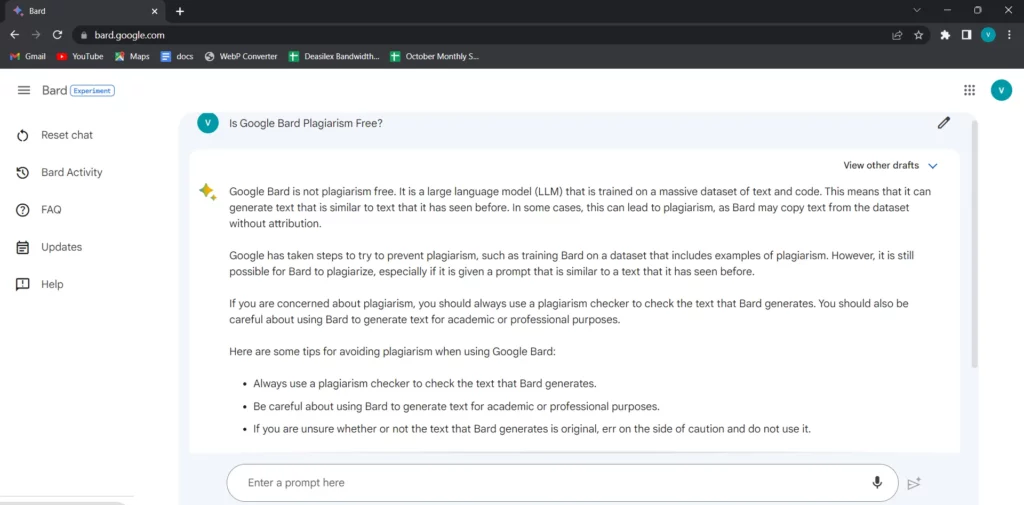
Then we copied the response generated by Google Bard.
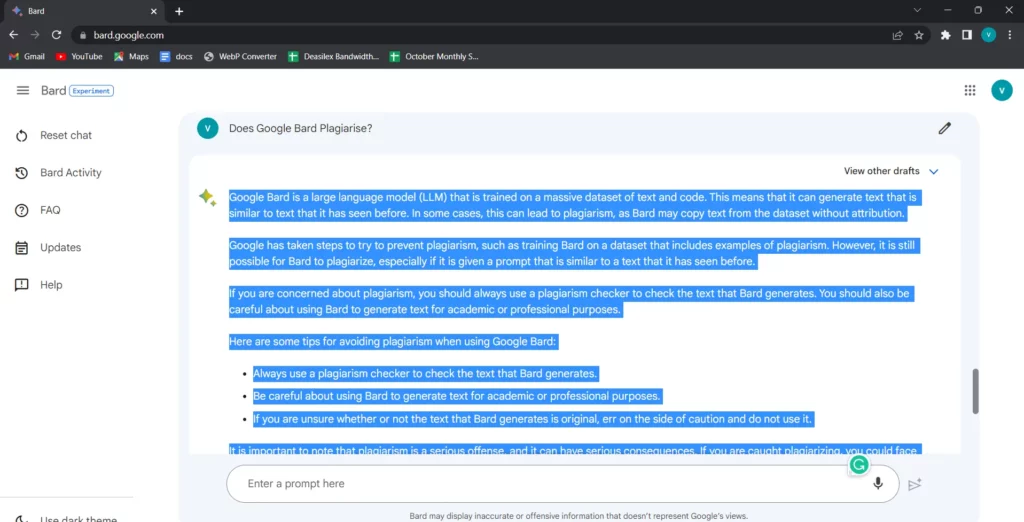
Next, we opened the Grammarly Plagiarism Checker and pasted Google Bard’s response.
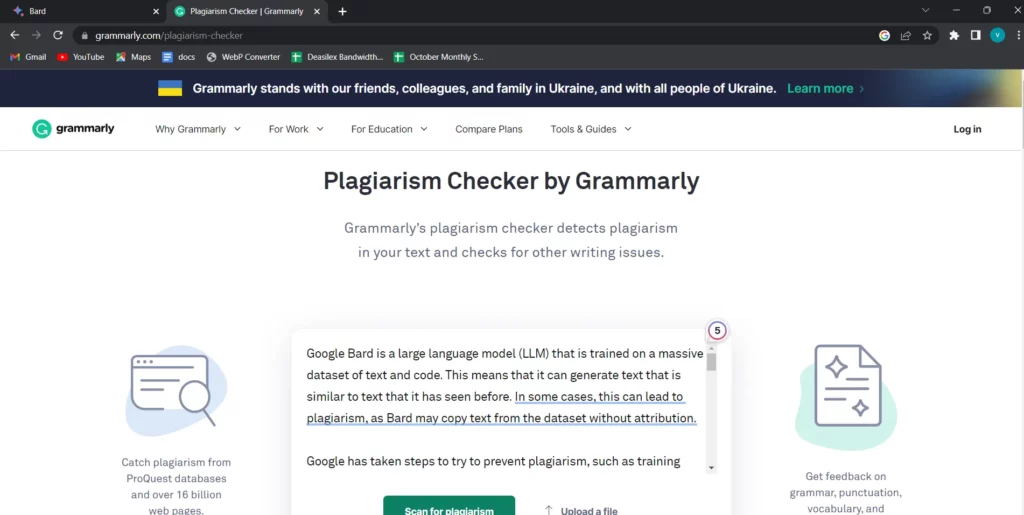
When we hit “Scan for plagiarism”, the report generated stated that “Significant plagiarism found”.
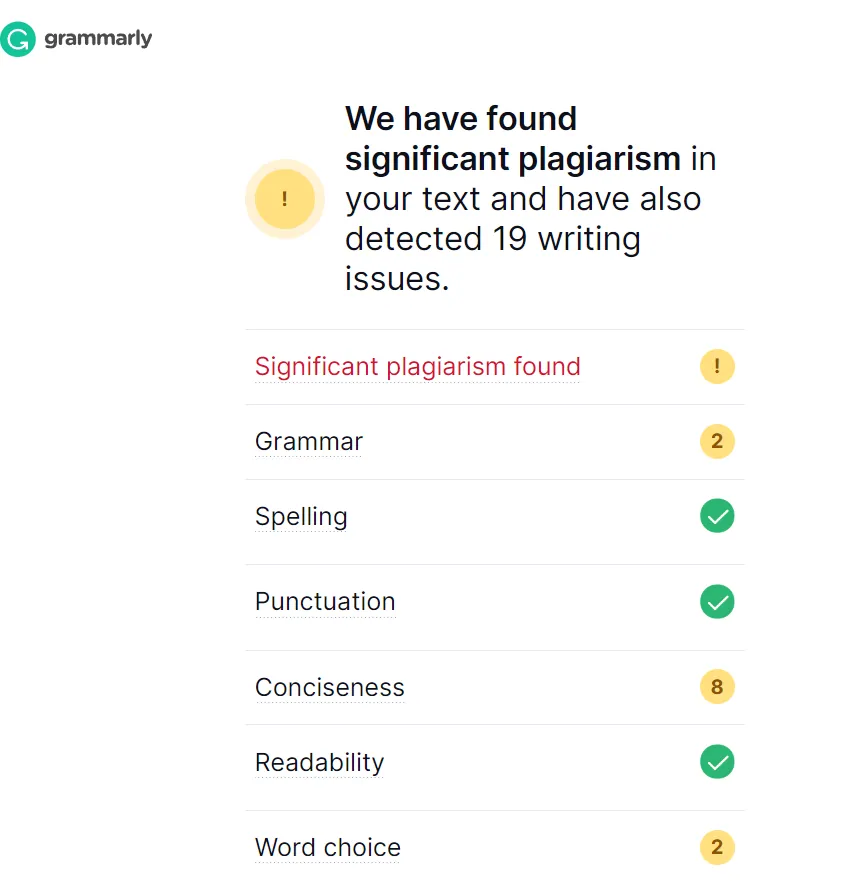
Not only did Google Bard show significant plagiarism issues, but it also displayed a few grammatical errors and other writing issues, as aptly pointed out by Grammarly.
Can Professors Detect If Students Use Google Bard Or ChatGPT To Write Essays?
Concerned students and professors are wondering can Google Bard can be detected as plagiarism. Yes, professors can detect if students use Google Bard or ChatGPT to write essays. They might need to use different ways to detect plagiarism of AI-generated content. Professors can make use of the following techniques to detect if students use Google Bard or any other AI bot.
- Use AI plagiarism detection tools to identify copied text from external sources.
- Check for language patterns that are found commonly among AI-generated content.
- Manually check for plagiarism, make use of their knowledge, and use their own judgment skills based on the student’s capabilities for submitting a well-written essay.
Limitations Of Plagiarism Detection
AI Plagiarism detection tools have now become a basic necessity for all educators. But are they foolproof? Can Google Bard be detected as plagiarism with the help of these AI plagiarism detection tools? While these AI detector tools benefit all students and their professors, they have their own limitations, like,
- When a text is similar to another, it will be flagged even if it is not actually plagiarized, resulting in false positives.
- If the content is skillfully paraphrased, AI detector tools fail to flag the contents, resulting in false negatives.
- AI detector tools will not be able to detect plagiarism of images, charts, and graphs.
Can Universities Detect Google Bard?
Yes, with the right AI plagiarism detection tools, universities can detect Google Bard. They will be able to detect most of the AI-generated content based on various factors like identifying the phrases and sentence structure that are commonly used by AI-generated content and the lack of personal pronouns as used by genuine authors.
If a university suspects that one of the students has used Google Bard for their assignment, they can make use of Turnitin or any other AI detector tools. However, before they penalize the students for plagiarism, it is essential that they take into account that most AI plagiarism detection tools are not foolproof. They might, at times, identify well-written assignments by students as plagiarism due to citations and paraphrasing.
Can Advanced Plagiarism Detection Technique Detects Google Bard Plagiarism?
Yes, advanced AI plagiarism detection techniques will be able to detect Google Bard plagiarism. They make use of machine learning to identify all AI-generated content. These machine-learning algorithms are trained to identify patterns in all AI-generated content that are not found in articles written by humans.
Most advanced AI detector tools make use of a number of factors to identify AI-generated text, like,
- Sentence structures and certain phrases are commonly used by most AI-generated content.
- Usage of repetitive information.
- Lack of personal pronouns that symbolize human authors.
- Application of codes and mathematical formulas in a way that is typically not used by humans.
How To Avoid Plagiarism While Using Google Bard?
Now that you know the answer to can Google Bard be detected as plagiarism, let us now see some preventative measures for plagiarism while using Google Bard.
Concerned users who wish to take caution against plagiarism should first understand the risks of using Google Bard. Some of the advanced AI detector tools are well-equipped to identify plagiarism, even if the content has been paraphrased and disguised. However, you can take the necessary precautionary steps if you want to avoid plagiarism while using Google Bard.
1. Use Citations
Always make use of the correct citations to give credit to the original authors. Even if you use Google Bard to generate content, ensure that you cite your sources to avoid plagiarism.
2. Paraphrase
Refrain from copy-pasting the content generated by Google Bard. Always paraphrase the content generated, and make use of the appropriate information for your assignment. You can use Google Bard for reference to write your assignment in your own words.
3. Writing Style
Every person has their very own unique writing style. Make sure that you use the information generated by Google Bard, and write it in your own style to avoid plagiarism.
4. Use a Plagiarism Checker
Before you submit your work, make sure that you check your content for plagiarism, making use of any plagiarism checker that is available online. This will help you to identify all instances of plagiarism in your article.
Wrap Up
Content generation with AI chatbots has gained significant popularity with the advancement of AI technology in recent years. Users make use of Artificial Intelligence to create content that is based on text, images, and videos. It has been of immense help to all kinds of users, from students to large business organizations, for creating high-quality content easily. When you make use of such AI technology for your work, it is of utmost importance that you check your work for plagiarism to avoid illegalities. We hope that you have now found your answer to ‘Can Google Bard be detected as plagiarism?’ and make the best use of it appropriately for your future endeavors.
Frequently Asked Questions
Q1. Can Google Bard’s Content Be Considered Plagiarism If It Generates Original Text?
Google Bard generates it responses from a large set of databases. But does it generate original text? It is currently not capable of generating entire text originally. All of Google Bard’s responses are based on the available data.
Q2. How Can Content Creators Ensure Their Use Of Google Bard Is Not Flagged As Plagiarism?
To ensure that Google Bard’s contents are not flagged as plagiarism, content creators can ensure that they paraphrase and alter the responses. Instead of copy-pasting the entire text generated, content creators can rephrase the response to avoid being flagged. They can also make use of an AI plagiarism detection tool to check for plagiarism.
Q3. Does Turnitin Detect ChatGPT?
Turnitin is an AI detector tool that makes use of various methods to successfully detect all AI-generated content, including ChatGPT. It will flag all the suspicious content that does not display the characteristics of a human author.

